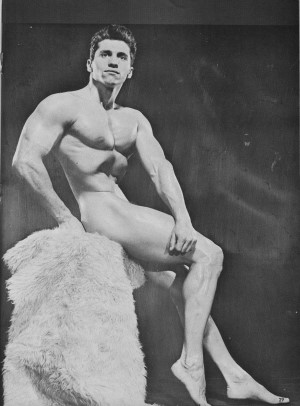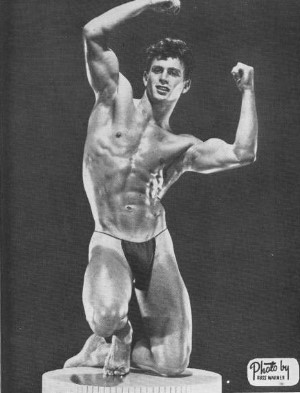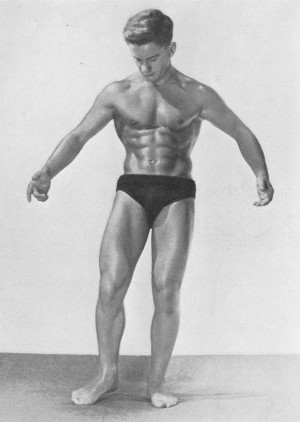by David Martin
Somewhere some time back I caught sight of someone accusing our Editor of having a “Positive Philosophy” — and I shuddered.
Why? Well, partly because I know that almost every time that a guy is positive about something, it ” ain’t so. Secondly, I have recently ploughed through the maze of verbiage that surrounds a fairly new philosophy called “Logical Positivism” and would hate to have Henry Atkin mixed up with that.
Of course, the reader never meant anything like that at all. What he really wanted to say was, “Henry Atkin is an optimist and believes in action plus thought, and not thought without action, and certainly not action without thought” However, the study of Logical Positivism has its discipline, and some very pungent remarks can be made against woolly thinkers in other fields.

For instance, say the L.P. devotees, “Statements may be divided into two orders, those which are subjective opinions and those which are tautologies.” The psalms of David are bung full of tautologies such as “The meek will He guide in Judgement and the meek He will teach in his way.” The second half of that statement is a tautology used for the purpose of clarification. “All mathematical statements are tautologies” assert the L.P.s. “Two and two are four” is only saying by code “One-and-one and one-and-one are one-and-one-and-one-and one.” “Two and Four” are just short codes for something we already know.
The subjective statements are things like “that picture is beautiful,” for such a statement is only valid for the person who makes it, and other people may think the picture is ugly.
You now see how beautiful a maze civilisation and education and philosophy have built around truth — but of what is this maze constructed ? Words, words, words … as Hamlet has said with delightful sarcasm. Can words destroy this maze? Possibly. But the fact is that, as I pointed out in my first article for BODY CULTURE, Charlie Marx has already said, ” Philosophers have philosophised about the world long enough — our task is to change it.”
Armed with this weapon against thought, the Communist Party of Soviet Russia set out to change the world, using, as they thought, the logic of mathematics, and a fine mess they are getting into.
A long while ago I coined an aphorism that would perhaps solve their problem for them. I am so proud of this particular truism that I shall refer to it from time to time. If it is my only contribution to the maze of words around thought, I think that I have justified ray entry into the conclave of word-jugglers.
”The desire to be logical is an emotional desire.” I am going to repeat that again and again until it makes a hit somewhere, and stops a lot of cold, ”logical ” emotionalists from destroying beauty, hope and love from the face of the earth.
The pragmatists say in essence that if it works, it is true, and unfortunately this goads all sorts of people into making things work temporarily, even although they know they are not true. The whole army of capitalist political economists are devoted to making the lie that ”money has value and interest is a law of nature” a pragmatic truth, which, of course, is an abuse of the power of thought.
The power of thought is its ability to make things happen which otherwise would seem impossible. Heavier-than-air flight is an example of the power of thought being put into action and achieving the apparently miraculous. But thought cannot change the laws of nature. We only fly by the operation of these laws in our favour, by turning demonstrable facts into useful allies. Therefore, a man can add to his stature by taking thought (in spite of the Bible), but not in spite of the laws of physiology — only by applying them.
”You can if you think you can” is only partly true. It would be more accurate to say, ”You can, if you know the correct method and use it “; but it is also very likely that ” If you think you can’t you jolly well won’t.” So optimism, tempered by knowledge, plus action, guided by experience, is the correct attitude for the would-be successful.

It is my duty to help you with optimism and knowledge. In this magazine you get the sum total of experience and knowledge of all its writers — but the ACTION can only come from YOU.
It is amazing how many people talk themselves out of success because they have an emotional reflex against the road that they must take to obtain it. We have a lad in the club whose resistance to instruction is as automatic and as deadly to himself as the lemmings’ impulse to migrate.
He finds he can Press more by sagging, so he sags away happily until he is almost doing a wrestler’s bridge. Then he gets VERY annoyed because his poundages are static over long periods. Tell him anything like this and he says, ”Oh, but I’m different.” There is hope for him, however, for after we have been plugging any particular criticism for a long time he sneaks off and tries it out our way and naturally improves a little. The whole process comes, I believe, from the fact that he is a simple lad at heart, and must have been the victim of so many leg-pulls as a child that he believes nothing is true unless he finds it out for himself. Slowly . . . very slowly, however, he is finding that anything I tell him usually works, and so must be one day he may become a less intransigent pupil.
In some ways lie is pitifully afraid of being physically hurt or suffering defeat, therefore he is willing to challenge anyone smaller than he is to a wrestling match or test of strength. When he meets his equal or superior he usually excuses himself by saying, ”Oh, but you’re older (or younger !) than I am.”
In spite of all this he makes slow progress and can now (in the worst of styles) press twenty per cent, over body weight and hold a wobbly hand balance for sixty seconds. What really annoys one, however, is the fact that he is potentially the strongest boy in the club.
Can you see any little quirks in yourself that are holding you back like the youth to whom I refer? You can — if you don’t think you can’t. You can, if you are willing to exert yourself. You can, if you are prepared to make the effort, even though the effort brings a little discomfort, a little pain, and a little sacrifice.
One of the greatest incentives is competition, and politicians are wearing out their sub-standard brains trying to synchronise competition and co-operation in the productive and inventive fields. They must always fail, because they want to exploit the competitive spirit for their own personal gain, and the masses have been so often spurred to do their best and had the results filched from them by law and money-jugglery that they almost instinctively unite in cooperation against the re-introduction of competitive instincts, in which, like the gladiators of old, like fights like, for the benefit of a cynical spectator.
In sport and body-building the competitive spirit is only utilised by the participants for their mutual benefit, and no third party cashes in — that is, in amateur sport, anyway. Professional sport is not sport at all, but business. Mostly dirty business. We have evolved a system at our club in which the competitive spirit is used to make our members WORK. The powerful emotion of wanting to win has been allied to the powerful thought that one is helping another to get more benefit from his exercises.
We also economise in the use of the barbells, because in each case two men are using one barbell together. It is like this. Two men sit facing each other on a bench as close as their knees will let them, and between them is a barbell with a fairly good curling poundage. Very few people are exactly equal in curling Strength, so each decides how many curls he can get out of the weight at one set. The strongest starts with, say, ten curls and as soon as he has finished he hands the bar to his opponent, who tears off eight and hands it back. The competition is won bv the guy that gets the most sets out of the bar. If you want to fight to a standstill you can drop one repetition each set after the first two.
The same system can be applied to Pullovers, both bent arm and straight, by-two lifters lying head to head. The Press Behind Neck and Military Press can also be tried if you remember the transference of the bar is easier when it is at arms’ length.
Floor and parallel bar dips can be done on a straight repetition competitive method, as both trainees are using their own bodyweight. If you have plenty of bars in your club the whole thing can be speeded up by the exercisers working simultaneously, each trying to keep it up longer than the other.
Experience will show you that yon could have always obtained more repetitions than you thought possible from a certain poundage. By actual experiment you will have proved that the goad of competition in your mind has given your body more power. The limitations you have allowed your mind to put on your muscles have been removed by that same power.
Your opponent will be glad he had you to spur him on to obtaining a real work-out, and so will you. No third party gains from you, but you have both realised the truth that the great emperor and philosopher, Marcus Aurelius, was right when he said,”Life is more like wrestling than dancing. Our adversary is our helper.”
What, back to philosophy again? Yes. And also the power of words. One of my boyhood heroes was Mr. Earle Liederman. His strong jaw used to jut out from the advertisement sections of the old Black Mask magazine, and he used to blare at me, “That man inside YOU. What is he doing to make himself a REAL man ? What sort of a guy will you be next year ? Are you skinny and undeveloped or would you like to be the sorta guy folks are PROUD to know ? ”
Of course, Mr. Liederman was selling a muscle course, but I ignored that. Mr. Liederman was far, far away in America, but his words inspired me just the same. Well, go on . . . READ that advertisement of Mr. Liederman’s over again. Ask yourself its questions. Mr. Liederman isn’t dealing in postal courses any more. He is the editor of a magazine that, in spite of a certain bombast and blah, still carries that same message of punch and power that seems to exude even from Mr. Liederman’s photographs.
Over here in Britain we are a little more modest. We try and tell the truth, even when it is not so pleasant as an invention. BUT we do believe, «is Mr. Liederman believes, that optimism, if it results in action, is a better attitude of mind than pessimism. BUT it must take action.
While you have been reading this magazine you have been thinking. When you get along to the club let your thoughts result in ACTION. Don’t debate with everyone what is good practice or bad during exercise periods. If you want to debate, join a debating club — a weight-lifting club is a weight-lifting club.
That’s what you go for. Do it and the results are as certain as any thing on this earth. You will be stronger, healthier and happier . . . TRY IT!
From Body Culture, volume 2 № 1, December 1950




